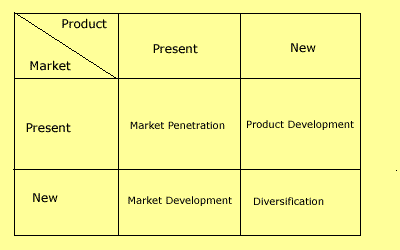Ansoff’s Matrix – Planning for Growth
This well known marketing tool was first published in the Harvard Business Review (1957) in an article called ‘Strategies for Diversification’. It is used by marketers who have objectives for growth. Ansoff’s matrix offers strategic choices to achieve the objectives. There are four main categories for selection.
Market Penetration
Here we market our existing products to our existing customers. This means increasing our revenue by, for example, promoting the product, repositioning the brand, and so on. However, the product is not altered and we do not seek any new customers.
Market Development
Here we market our existing product range in a new market. This means that the product remains the same, but it is marketed to a new audience. Exporting the product, or marketing it in a new region, are examples of market development.
Product Development
This is a new product to be marketed to our existing customers. Here we develop and innovate new product offerings to replace existing ones. Such products are then marketed to our existing customers. This often happens with the auto markets where existing models are updated or replaced and then marketed to existing customers.

Diversification
This is where we market completely new products to new customers. There are two types of diversification, namely related and unrelated diversification. Related diversification means that we remain in a market or industry with which we are familiar. For example, a soup manufacturer diversifies into cake manufacture (i.e. the food industry). Unrelated diversification is where we have no previous industry nor market experience. For example a soup manufacturer invests in the rail business.
Ansoff’s matrix is one of the most well know frameworks for deciding upon strategies for growth.
